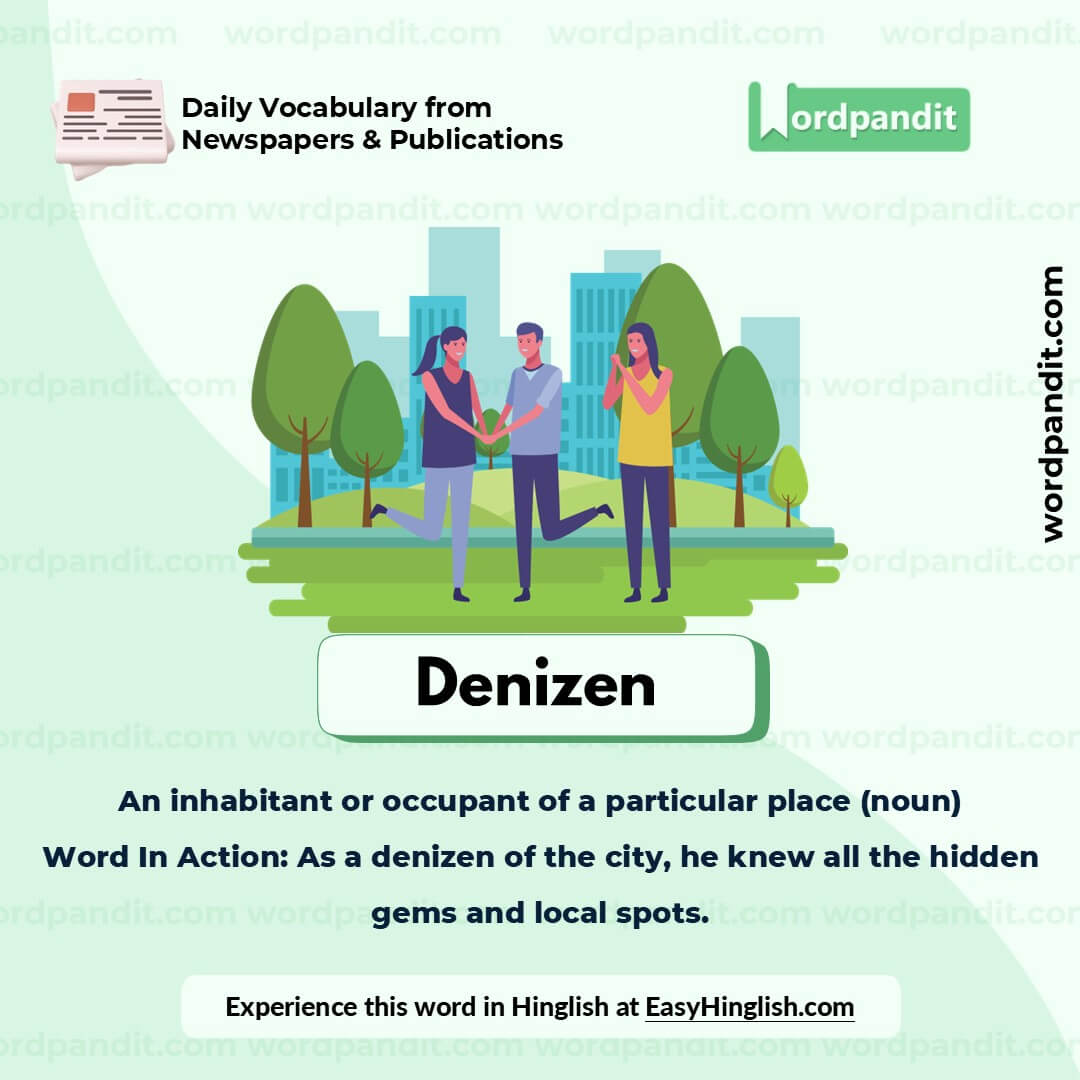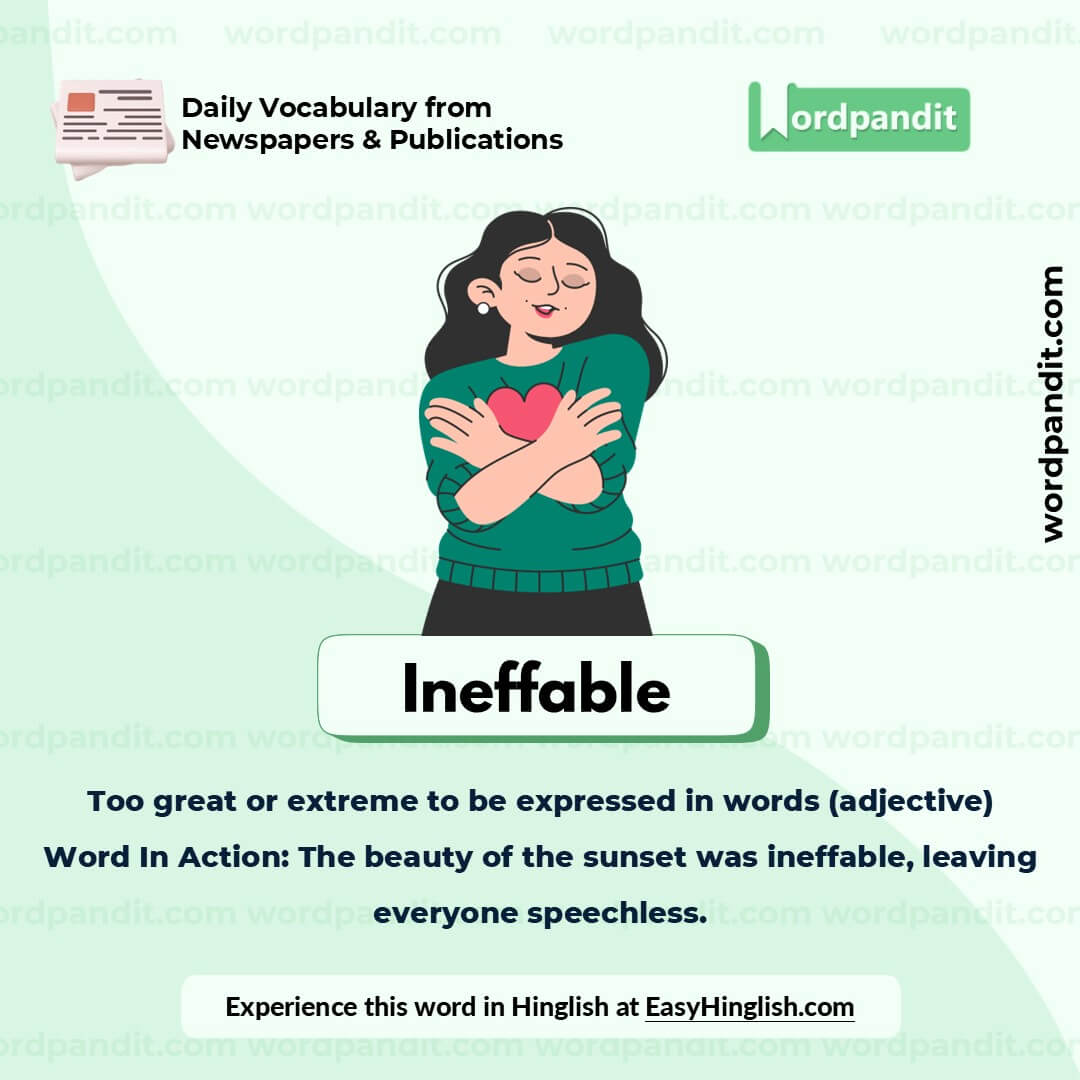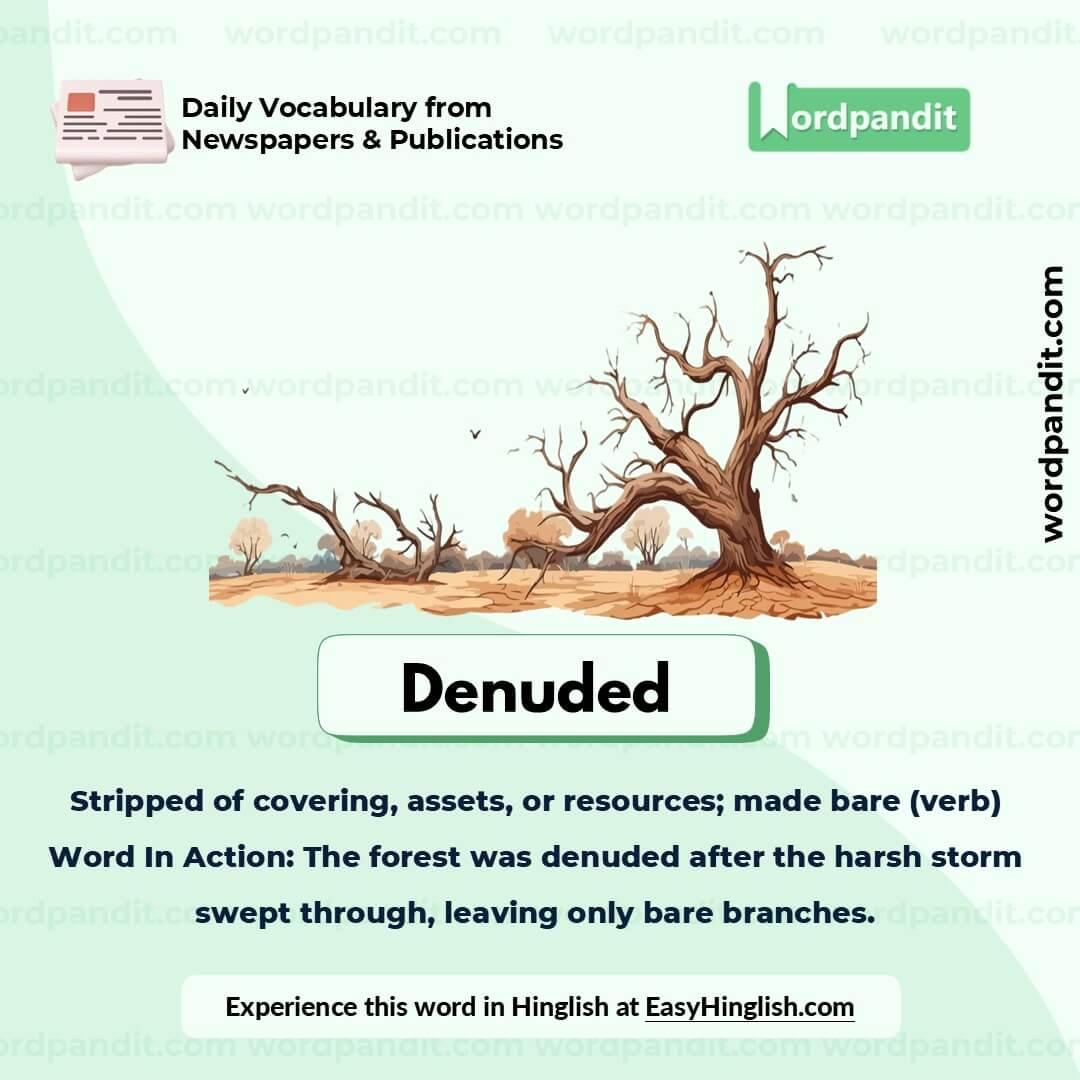Daily Vocabulary from International Newspapers and Publications
Expand Your Vocabulary with Wordpandit’s Global Vocabulary Hub
At Wordpandit, we are committed to helping you develop a truly global vocabulary by drawing from some of the most respected international publications. This section is designed to keep you ahead of the curve by introducing you to words that define global conversations and trends.
The Power of Global Sources
To help you think and communicate on a global scale, we curate vocabulary from renowned international sources, such as:
- The New York Times
- The Washington Post
- BBC
- The Guardian
- The Economist
- Scientific American
- Psychology Today
- And many more...
Stay Global, Stay Competitive
Our daily updates from international publications ensure you are consistently exposed to new words that reflect global news and developments, making sure your vocabulary is not only current but also globally relevant.
Enhance Your Global Perspective
Whether you’re preparing for international exams, aiming to excel in global business communication, or want to enhance your language skills for personal growth, Wordpandit offers the resources you need to thrive in a global context.
Effective Learning, Global Reach
Our learning methodology combines global examples, memory aids, and interactive activities, allowing you to internalize new words effectively and apply them in real-world scenarios.
Begin Your Global Vocabulary Journey Now!
Why Choose Wordpandit?
Practical Learning: Focus on words you'll actually encounter in real-world reading, enhancing your comprehension and communication skills.
Diverse Content: From current affairs to scientific breakthroughs, our varied sources expose you to vocabulary across multiple domains.
Effortless Integration: Make Wordpandit a part of your daily routine. Just a few minutes each day can significantly boost your lexicon over time.
Your Path to Vocabulary Mastery
- Visit our Daily Vocabulary section regularly
- Explore new words and their usage in context
- Practice incorporating these words into your own writing and speech
- Track your progress as your vocabulary expands
Start Your Journey Today
Embark on your vocabulary enhancement journey with Wordpandit. By consistently engaging with our daily posts, you'll build a robust vocabulary that serves you well in academic, professional, and personal contexts.
Remember, a word a day keeps linguistic limitations at bay. Make Wordpandit your daily companion in the quest for vocabulary excellence!
WORD-1: Denizen
Context:
"Inside the Tory party sinkhole, its denizens pretend to understand what has befallen them." - The Guardian
Explanatory Paragraph:
The word denizen refers to an inhabitant or regular occupant of a place. It often conveys the sense that these individuals are deeply familiar with or shaped by their environment. In this context, "denizens" are people who dwell within a certain social or political group, accustomed to its workings and culture.
Meaning: An inhabitant or occupant of a particular place (noun)
Pronunciation: DEN-i-zuhn
Difficulty Level: ⭐⭐ (Intermediate)
Etymology: From Old French deinz ("within") + de ("from").
Synonyms & Antonyms:
Synonyms: resident, inhabitant, occupant, local
Antonyms: outsider, visitor, stranger, foreigner
Usage Examples:
- The denizens of the forest know its every secret path.
- She was a denizen of the local coffee shop, spending hours there each day.
- In the business district, corporate denizens rush between meetings.
- The library is a refuge for the intellectual denizens of the city.
Cultural Reference:
"Denizens of the deep" often refers to sea creatures like whales and giant squids who inhabit the mysterious depths of the ocean.
Think About It:
How does a person's environment shape them as a denizen of that place?
Quick Activity:
Identify a place where you spend a lot of time. Write a short paragraph explaining what makes you a denizen of that place.
Memory Tip:
Think of "denizen" as "in the zone" to remember someone who belongs or is a regular occupant of a place.
Real-World Application:
The word "denizen" can be useful when discussing people who are closely tied to a particular environment, whether it's physical (like a city or region) or social (like a group or organization).
WORD-2: Belligerent
Context:
"The United States is already at war and it is very much a willing belligerent in a conflict of its own making." - Al Jazeera
Explanatory Paragraph:
The term belligerent refers to someone who is hostile and aggressive, especially in the context of conflict or war. It describes parties actively engaged in a war or conflict, often showing a readiness to fight.
Meaning: Hostile and aggressive, especially in conflict (adjective)
Pronunciation: buh-LIJ-er-uhnt
Difficulty Level: ⭐⭐⭐ (Intermediate)
Etymology: From Latin belligerant meaning "waging war"
Synonyms & Antonyms:
Synonyms: hostile, aggressive, combative, quarrelsome, warlike
Antonyms: peaceful, calm, cooperative, friendly, pacifist
Usage Examples:
- The country's belligerent stance made diplomatic negotiations nearly impossible.
- He became belligerent when he was questioned about his involvement in the altercation.
- The belligerent powers refused to agree to a ceasefire.
- She gave a belligerent speech, calling for action against their rivals.
Cultural Reference:
"In peace, sons bury their fathers. In war, fathers bury their sons." - Herodotus
Think About It:
What are the long-term consequences of a belligerent approach to international relations?
Quick Activity:
Think of a current global conflict. Write a brief paragraph describing how belligerent actions have escalated the situation.
Memory Tip:
Remember "belligerent" by thinking of "bell" as in "battle," reminding you of war and aggression.
Real-World Application:
Understanding the word "belligerent" can help you analyze global conflicts and recognize aggressive behavior in personal or political contexts.
WORD-3: Rebarbative
Context:
"The fundamental tenets of everything Conservatives believe are now so rebarbative." - The Guardian
Explanatory Paragraph:
The word rebarbative describes something that is unpleasant, unattractive, or repellent, often in an offensive way. In this context, it suggests that the core beliefs of the Conservatives are perceived as distasteful or off-putting.
Meaning: Repellent or objectionable; unattractive (adjective)
Pronunciation: ree-BAR-buh-tiv
Difficulty Level: ⭐⭐⭐⭐ (Advanced)
Etymology: From French rébarbatif, meaning "stern" or "grating," derived from Latin rebarbus, meaning "opposing."
Synonyms & Antonyms:
Synonyms: repellent, unattractive, offensive, unappealing, distasteful
Antonyms: attractive, pleasing, appealing, engaging
Usage Examples:
- The rebarbative decor of the old restaurant turned away many potential customers.
- Her rebarbative personality made it difficult for her to make friends.
- The rebarbative language in the article was meant to provoke rather than inform.
- The rebarbative policies of the regime were widely criticized by the international community.
Cultural Reference:
In literature, characters with rebarbative traits are often written to elicit strong reactions from readers, creating tension and depth in the narrative.
Think About It:
How can something initially rebarbative change over time to become more appealing or acceptable?
Quick Activity:
Think of a time when you encountered something or someone rebarbative. How did you handle that situation, and did your perception change?
Memory Tip:
Link "rebarbative" to "barbed wire"—something sharp and repellent, much like the meaning of the word.
Real-World Application:
"Rebarbative" is useful when discussing things that are meant to provoke or offend, often found in heated debates, critiques, or reviews.
WORD-4: Ineffable
Context:
"Any opinion they proffer beyond the ineffably banal is a gaffe." - The Guardian
Explanatory Paragraph:
The word ineffable is used to describe something so great or extreme that it cannot be expressed in words. It often refers to things that are beyond human comprehension or description, such as profound beauty, joy, or sadness. In this context, "ineffably banal" means that their opinions are so unimaginative and dull that they're beyond description.
Meaning: Too great or extreme to be expressed in words (adjective)
Pronunciation: in-EFF-uh-bul
Difficulty Level: ⭐⭐⭐ (Intermediate)
Etymology: From Latin ineffabilis, meaning "unutterable" (in- "not" + effabilis "able to be spoken").
Synonyms & Antonyms:
Synonyms: indescribable, unutterable, inexpressible, transcendent, overwhelming
Antonyms: expressible, describable, explainable, definable
Usage Examples:
- Standing atop the mountain, he was struck by the ineffable beauty of the view.
- Her joy at the news was ineffable—words could not capture her emotions.
- The ineffable sadness of the moment lingered long after the event ended.
- The ineffable grace of the ballerina left the audience speechless.
Cultural Reference:
In many religious and spiritual traditions, the divine or sacred is often described as ineffable, something beyond human understanding or language.
Think About It:
What experiences or feelings in your life could you describe as ineffable?
Quick Activity:
Write about an ineffable moment in your life—something so profound or emotional that you struggled to put it into words.
Memory Tip:
Think of "ineffable" as "in+effable," where "effable" means able to be expressed, so "ineffable" means not expressible in words.
Real-World Application:
Use "ineffable" when describing powerful emotions, awe-inspiring beauty, or deeply spiritual experiences that cannot be adequately captured in words.
WORD-5: Denuded
Context:
"Everyone sees denuded public services." - The Guardian
Explanatory Paragraph:
The word denuded means to strip away or make bare, leaving something exposed or depleted. It can refer to both literal and figurative situations. In this context, "denuded public services" refers to services that have been stripped of resources, making them ineffective or diminished in capacity.
Meaning: Stripped of covering, assets, or resources; made bare (verb)
Pronunciation: dih-NOO-did
Difficulty Level: ⭐⭐ (Intermediate)
Etymology: From Latin denudare, meaning "to strip bare" (de- "away" + nudare "to strip or make naked").
Synonyms & Antonyms:
Synonyms: stripped, depleted, exposed, laid bare, uncovered
Antonyms: covered, enriched, protected, enhanced
Usage Examples:
- The forest was denuded after years of illegal logging.
- The company's budget cuts left many departments denuded of necessary resources.
- After the storm, the once lush garden appeared denuded of all its beauty.
- Years of underfunding had denuded the school of vital educational programs.
Cultural Reference:
In environmental contexts, "denuded landscapes" are often the result of deforestation or natural disasters, leaving the land barren and exposed.
Think About It:
What are the consequences of denuding a society's key institutions or natural resources?
Quick Activity:
Identify a service, institution, or natural resource that has been denuded in your community. Write a short paragraph describing the impact of this depletion.
Memory Tip:
Remember "denuded" by associating it with "nude"—something stripped bare or exposed, much like how denuded things are left without coverage.
Real-World Application:
"Denuded" is often used to describe systems, landscapes, or organizations that have been depleted or stripped of essential elements, often due to neglect or external forces.
















